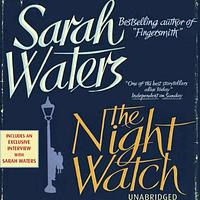Take a photo of a barcode or cover
I struggled with my rating on this one. It seems sad to give only 1 star to what feels like an author's greatest effort to date. And I did end up liking one of the characters a little.
Oh well.
Luckily, this book improved after the first 250 dreadful pages. But isn't that a long time to wait for improvement? See my earlier comment for the defects of the book's Part One (takes place in 1947). Part two, set three years earlier, is certainly less boring, but only because the war was still on, not because the plot or characters became more interesting.
I continued to get the impression that the characters didn't inhabit their environment so much as they were transported there against their will. For all her mentions of ration books, warning sirens, etc., Waters utterly fails to make 1944 London come alive. Furthermore, the prose is not strong. The only bold images were things that need no embellishment to be vivid - bombs, abortion, hemorrhage.
While more readable than Part One, Part Two still fell short of interesting, and Part Three, set in 1941 and only about 30 pages long, was sloppy and predictable.
Oh well.
Luckily, this book improved after the first 250 dreadful pages. But isn't that a long time to wait for improvement? See my earlier comment for the defects of the book's Part One (takes place in 1947). Part two, set three years earlier, is certainly less boring, but only because the war was still on, not because the plot or characters became more interesting.
I continued to get the impression that the characters didn't inhabit their environment so much as they were transported there against their will. For all her mentions of ration books, warning sirens, etc., Waters utterly fails to make 1944 London come alive. Furthermore, the prose is not strong. The only bold images were things that need no embellishment to be vivid - bombs, abortion, hemorrhage.
While more readable than Part One, Part Two still fell short of interesting, and Part Three, set in 1941 and only about 30 pages long, was sloppy and predictable.
I really enjoyed this and it seems like a great book to read in difficult times. I will miss these characters.
The way the novel is written - moving backward in time - was both compelling and sometimes puzzling. I enjoyed the interactions between all the different characters and their introspective moments, but I also felt at times that the book was lagging and like I was waiting for some sort of "big reveal" or revelation that never really came.
Not as strong as the other Sarah Waters books but a good look at England during WWII.
Interesting enough as I read it but not so compelling I kept wanting to pick it back up. Not much happens. It's basically lesbians in WWII. Lesbians and gays, and their lives in London during and immediately after the war. The story is told backwards, which is kind of clever, but honestly this book didn't really do much for me. There was nothing *wrong* with it, per se; I just felt lackluster about this book in which nothing really happens and yet it's 500 pages long.
emotional
reflective
medium-paced
Plot or Character Driven:
Character
Interesting view of the war, but not gonna make you jump for joy when you finish.
The Night Watch begins in 1947, introducing us to four Londoners who are trying to recover from the Second World War. None of them fought, but each of them was scarred in their own way by their wartime experiences. We see them living in situations that are not right for them--isolated and alone, stuck in the wrong relationships, working the wrong job, mired in inertia. From this point, the book moves backwards rather than forwards, first to 1944 for a long middle section that shows us some of the events that brought the characters to the point where we met them in '47, and then very briefly to 1941, for a glimpse at the earliest beginnings of these situations and relationships.
The backwards chronology is the thing that most distinguishes this book from others and I found it really fascinating, but I'm not totally convinced that it worked. On a page-by-page basis, I really enjoyed reading the book and certain scenes were tremendously gripping, but the plot lacked momentum. Certain conclusions were foregone: when a character was in a life-threatening situation in 1944, I wasn't in suspense about whether she'd live--I'd already seen her going through her daily routine in 1947. The beginning of the book felt like a true beginning and I liked that about it; I wanted to follow the characters through those circumstances, to see if the little glimmers of hope that Waters gave to the characters in 1947 turned into meaningful changes to their circumstances, but instead I had to go backwards with the character to '44 and '41, and could only imagine for myself what might become of these characters in a forward-moving timeline. Usually I appreciate (sometimes even prefer!) open-ended conclusions to stories. Why did it feel so different when the open-ended conclusion came at the beginning? And would these stories have worked if they had been told in conventional chronology? I've turned the various plots around and around in my mind, but I still can't answer that question to my own satisfaction.
There is something fatalistic about these stories told back-to-front, everyone's outcome sealed by the time the story begins. Those first meetings that happen in '41, hopeful, flirtatious, or tender as they may be--well, we know already where they all lead. At points this makes the novel feel airless, depressing. But at other points it simply seems absolutely accurate and right. I've read a decent number of war novels, but I don't think I've ever read such a realistic and substantial portrayal of survivors in the aftermath of war, irrevocably changed by their experiences and doing the work of carrying on with their lives.
Waters's unconventional structure obviously occupied a lot of my thoughts about The Night Watch, but there are other things that are worth mentioning too. I thought it was absolutely tremendous as a work of historical fiction--perhaps the best Waters novel in that regard. Her depiction of day-to-day life on the home front during the late stages of the war is remarkably vivid and compelling. Really impressive. And she managed to write scenes that were so gripping that I stayed up later than I meant to reading them even though I already knew the outcome. That is also really impressive. There are some lovely bits of echoing and circularity facilitated by the structure. There is a tremendous portrayal of the community of butch women who drove ambulances through London during the Blitz. Really, there is a lot to like about this book. It won't replace Affinity at the top of my list of best Sarah Waters novels, nor will it knock Fingersmith from the top of my list of most fun Sarah Waters novels, but it was worth reading.
The backwards chronology is the thing that most distinguishes this book from others and I found it really fascinating, but I'm not totally convinced that it worked. On a page-by-page basis, I really enjoyed reading the book and certain scenes were tremendously gripping, but the plot lacked momentum. Certain conclusions were foregone: when a character was in a life-threatening situation in 1944, I wasn't in suspense about whether she'd live--I'd already seen her going through her daily routine in 1947. The beginning of the book felt like a true beginning and I liked that about it; I wanted to follow the characters through those circumstances, to see if the little glimmers of hope that Waters gave to the characters in 1947 turned into meaningful changes to their circumstances, but instead I had to go backwards with the character to '44 and '41, and could only imagine for myself what might become of these characters in a forward-moving timeline. Usually I appreciate (sometimes even prefer!) open-ended conclusions to stories. Why did it feel so different when the open-ended conclusion came at the beginning? And would these stories have worked if they had been told in conventional chronology? I've turned the various plots around and around in my mind, but I still can't answer that question to my own satisfaction.
There is something fatalistic about these stories told back-to-front, everyone's outcome sealed by the time the story begins. Those first meetings that happen in '41, hopeful, flirtatious, or tender as they may be--well, we know already where they all lead. At points this makes the novel feel airless, depressing. But at other points it simply seems absolutely accurate and right. I've read a decent number of war novels, but I don't think I've ever read such a realistic and substantial portrayal of survivors in the aftermath of war, irrevocably changed by their experiences and doing the work of carrying on with their lives.
Waters's unconventional structure obviously occupied a lot of my thoughts about The Night Watch, but there are other things that are worth mentioning too. I thought it was absolutely tremendous as a work of historical fiction--perhaps the best Waters novel in that regard. Her depiction of day-to-day life on the home front during the late stages of the war is remarkably vivid and compelling. Really impressive. And she managed to write scenes that were so gripping that I stayed up later than I meant to reading them even though I already knew the outcome. That is also really impressive. There are some lovely bits of echoing and circularity facilitated by the structure. There is a tremendous portrayal of the community of butch women who drove ambulances through London during the Blitz. Really, there is a lot to like about this book. It won't replace Affinity at the top of my list of best Sarah Waters novels, nor will it knock Fingersmith from the top of my list of most fun Sarah Waters novels, but it was worth reading.
emotional
informative
tense
slow-paced
Plot or Character Driven:
Character
Strong character development:
Yes
Loveable characters:
No
Diverse cast of characters:
Yes
Flaws of characters a main focus:
No
I enjoyed the ‘back to front’ storytelling and the incorporation of WW2 into the character’s stories, but found this a little too slow-paced to really enjoy
emotional
mysterious
sad
slow-paced
Plot or Character Driven:
Character
Strong character development:
Yes
Loveable characters:
Complicated
Diverse cast of characters:
Yes
Flaws of characters a main focus:
Yes
I didn't like this book at first but it slowly drew me in.... But then I got bored again! I enjoyed learning about life in the blitz and after the war for people marginalised by society, but it was just too slow for me and I didn't find learning all the back stories that fascinating - I would have preferred to go back to 1947 and learn more about how people coped in the aftermath of war . So an OK read but a bit too slow and long for my liking






